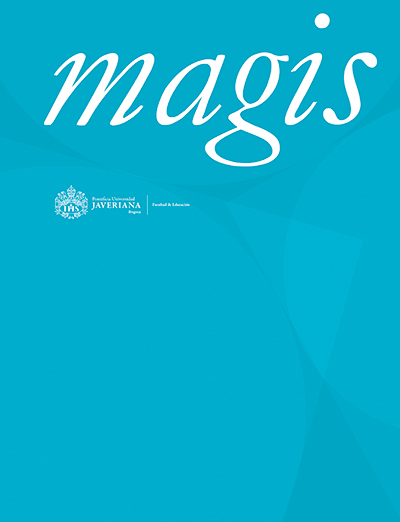Resumo
This article explores the concept of learning as a space of exchange and connection between signs, events and bodies, inspired by Gilles Deleuze’s philosophy of difference. This qualitative methodology is based on the rhizome, with, amongst others, its characteristics or principles of heterogeneity, multiplicity and a-signification. It allows a productive conversation with studies of learning environments and sense productions through images and sounds from cinema media, such as the swimmer and swimming. The focus of this article is on learning, its environment and its role in the relationship between mind and world, pointing to an alternative to the representational perspective.
Bellour, R. & Hardyck, A. (2012). Raymond Bellour: between-the-Images. Zurich: JRP/Ringier.
Bennett, J. (2010). Vibrant Matter: A Political Ecology of Things. Duke and London: Duke University Press.
Bhaskar, R. (1998). General Introduction. In M. Archer, R. Bhaskar, A. Collier, T. Lawson & A. Norrie (eds.). Critical Realism: Essential Readings, ix-xxiv, London: Routledge.
Bogue, R. (2008). Search, Swim and See. In I. Semetsky (ed.). Nomadic Education - Variations on a Theme by Deleuze and Guattari, 1-16. Rotterdam: Sense Publishers.
Brandom, R. (1994). Making it Explicit: Reasoning, Representing, and Discursive Commitment. Cambridge, Massachusetts: Harvard University Press.
Brandom, R. (2000). Articulating Reasons: An Introduction to Inferentialism. Cambridge, Massachusetts: Harvard University Press.
Brandom, R. (2004). The Pragmatist Enlightenment (and its Problematic Semantics), European Journal of Philosophy 12(1), 1-16. https://doi.org/10.1111/j.0966-8373.2004.00196.x
Buchanan, I. M. (2017). Assemblage Theory, or, the Future of an Illusion. Deleuze Studies, 11 (3), 457-474. http://dx.doi.org/10.3366/dls.2017.0276
Colman, F. J. (2010). Rhizome. In A. Parr (eds.). The Deleuze Dictionary, 232-235. Edinburgh: Edinburgh University Press.
Deleuze, G. (1968). Différence et repetition (Paris, Presses Universitaires de France, PUF). Difference and Repetition. Paul Patton (transl.). New York: Columbia University Press.
Deleuze, G. (1993). The Fold: Leibniz and the Baroque. Tom Conley (trans.). Minneapolis: University of Minnesota Press.
Deleuze, G. (2006). Nietzsche and Philosophy. Michael Hardt (trans.). New York: Columbia University Press, European Perspectives Series.
Deleuze, G. & Guattari, F. (1980). Mille Plateaux. (Paris: Minuit). A Thousand Plateaus, by Brian Massumi (trans.). Minneapolis: University of Minnesota Press.
Fodor, J. & Lepore, E. (2007). Brandom Beleaguered. Philosophy and Phenomenological Research, 74 (3), 677-691. https://doi.org/10.1111/j.1933-1592.2007.00045.x
Kawamura, Y. (2005). Lethe. Available at: https://www.youtube.com/watch?v=nTnEsNL7Y48
Lambert, G. (2012). In Search of a New Image of Thought: Gilles Deleuze and Philosophical Expressionism. Minneapolis: University of Minnesota Press.
MacLure, M. (2013). Researching without Representation? Language and Materiality in Post-Qualitative Methodology. International Journal of Qualitative Studies in Education, 26 (6), 658-667. https://doi.org/10.1080/09518398.2013.788755
Masny, D. (2013). Rhizoanalytic Pathways in Qualitative Research: Problematizing the Qualitative. Qualitative Inquiry, 19 (5), 339-348. https://doi.org/10.1177/1077800413479559
Masny, D. (2016). Problematizing Qualitative Research: Reading a Data Assemblage With Rhizoanalysis. Qualitative Inquiry, 22 (8), 666-675. https://doi.org/10.1177/1532708616636744
Mazière, M. (1987). Swimmer. United Kingdom, France. Available at: https://www.youtube.com/watch?v=yeqpjZnynoo
Rancière, J. (2013). Remarks by Way of a Postface. In P. Bowman (ed.). Rancière and Film, 185-193. Edinburgh: Edinburgh University Press.
Scott, D. (2011). Education, Epistemology and Critical Realism. London, New York: Routledge.
Sellars, W. (1997). Empiricism and the Philosophy of Mind. Cambridge, Massachusetts: Harvard University Press.
Semetsky, I. & Delpech-Ramey, J. A. (2012). Jung’s Psychology and Deleuze’s Philosophy: The Unconscious in Learning. Educational Philosophy and Theory, 44 (1), 69-81. https://doi.org/10.1111/j.1469-5812.2010.00670.x
Standish, P. (2016). The Disenchantment of Education and the Re-enchantment of the World. Journal of Philosophy of Education, 50 (1), 98-116. https://doi.org/10.1111/1467-9752.12176
Taylor, C. (1985). Human Agency and Language: Philosophical Papers 1, Chapter 1: What is Human Agency? and Chapter 3: Hegel’s Philosophy of Mind. Cambridge: Cambridge University Press.
Taylor, C. (2011). Dilemmas and Connections. Harvard, Massachusetts: Harvard University Press.
A revista magis, Revista Internacional de Pesquisa em Educação by Pontificia Universidad Javeriana encontra-se registada sob a licencia Creative Commons Versão 4.0 Internacional. Portanto, esta obra pode se reproduzir, distribuir e comunicar publicamente em formato digital, sempre que dado o crédito apropriado para os autores e a Pontificia Universidad Javeriana. Permite-se citar, adaptar, remixar, transformar, autoarquivar, republicar e criar a partir do material, para qualquer fim, mesmo que comercial, sempre que indicado apropriadamente o nome do criador, provido um link para a obra original e indicado se mudanças foram feitas. A Pontificia Universidad Javeriana não retém os direitos sobre as obras publicadas e os conteúdos são responsabilidade exclusiva dos autores, os quais conservam seus direitos morais, intelectuais, de privacidade e publicidade.
O aval sobre a intervenção da obra (revisão, correção, edição, tradução, formatação) e a subsequente difusão disponibiliza-se através de licença de uso e não através de transmissão de direitos, o que representa que a revista e a Pontificia Universidad Javeriana são isentas de qualquer responsabilidade que puder se derivar de uma prática ética pobre por parte dos autores. Em consequência da proteção fornecida pela licença de uso, a revista não fica na obrigação de publicar retratações ou alterar informações já publicadas, a não ser que a errata seja decorrente do processo de gestão editorial. A publicação de conteúdos nesta revista não representa royalties para os contribuintes.
Creative Commons Attribution 4.0 International Public License



